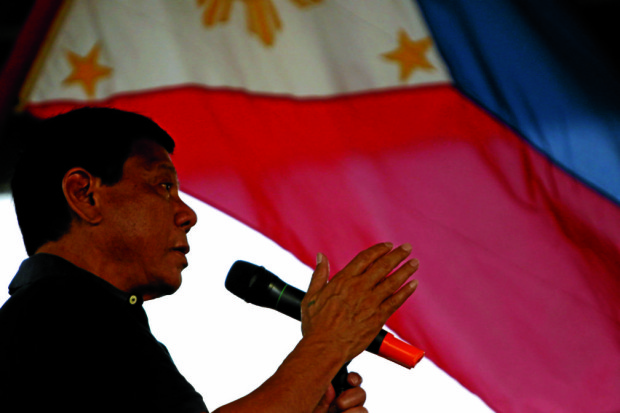Duterte’s shocking, shrewd shot at the Philippine presidency
Rodrigo Duterte launched his profanity-laced campaign to become president of the mainly Catholic Philippines with a tirade against the pope that included branding the revered figure’s mother a prostitute.
On the hustings since, the 71-year-old has joked about wanting to rape a murdered Australian missionary, and vowed to kill tens of thousands of criminals then pardon himself for mass murder.
Duterte has also bragged about his Viagra-fuelled serial adultery, called his daughter a “drama queen” for talking about being sexually abused, and told lawmakers he would shut down Congress if they did not follow his orders.
Using such tactics — which have drawn comparisons with US Republican Donald Trump and similarly upended conventional political wisdom — Duterte has become the shock favorite to win Monday’s election.
While it is easy to be fooled by Duterte’s controversial comments, analysts say he has shrewdly created an image as an anti-establishment figure capable of providing quick solutions to deep-rooted problems such as crime and poverty.
“He has become the symbol of frustration, maybe even desperation, of those who have put their trust and hope in the elite in this country,” Manila-based political analyst Ramon Casiple told Agence France-Presse.
READ: Why people are drawn to Duterte
Since the fall of dictator Ferdinand Marcos in 1986, the Philippines has been mostly ruled at local and national levels by a small group of families backed by powerful businessmen — a system that has helped entrench one of Asia’s biggest rich-poor divides.
The current president, Benigno Aquino III, belongs to such a clan and has in the final stages of his rule been fiercely criticized for what many voters regard as perpetuating an economic model that favors the wealthy.
Aquino has overseen an economy that has grown by an average of six percent a year since assuming the presidency in 2010, and won international plaudits for trying to tame crippling corruption.
But roughly one quarter of the nation’s 100 million people still live below the poverty line, barely changed from six years ago.
Targeting the elite, criminals
Duterte, a lawyer who has ruled the major southern city of Davao for most of the past two decades, has on the campaign trail repeatedly criticized the elite and the national power structure.
“When I become president, by the grace of God, I serve the people, not you,” he told reporters this week, referring to the elite.
“Shit. My problem is the people at the bottom of society… my problem is how to place food on the table.”
Duterte says the key to eradicating poverty is to end crime, and he is offering a brutal solution that bypasses a notoriously corrupt and inefficient judicial system — ordering security forces to kill criminals.
He promises to end crime within six months of his presidency, a seemingly impossible goal that nevertheless millions of Filipinos are embracing.
READ: Duterte on criminals: ‘Kill all of them’
A rank outsider in the presidential race a few months ago, Duterte is now front-runner with a double-digit lead over his rivals in surveys.
Aquino’s preferred successor, Mar Roxas, a US-educated scion of a powerful political family, is in equal second, struggling to overcome perceptions he has no empathy for the poor.
Death squad fears
To prove that he can end crime, Duterte has regularly pointed to his record in Davao, which he says he has turned into one of the Philippines’ safest cities.
Human rights groups allege Duterte’s zero-tolerance approach to crime has included running vigilante squads that have killed more than 1,000 people.
Duterte bragged in a recent television interview about running the squads, saying 1,700 people had actually been killed, and at other times denied any knowledge of them.
But he has been unequivocal about his vows to unleash hell on criminals, making those plans a central feature of every campaign speech.
In one address to a crowd in a small town in the northern Philippines attended by AFP, Duterte smiled as he gave business advice to those in the crowd to start up funeral parlors in preparation of him winning the election.
“The funeral parlors will be packed… I’ll supply the dead bodies,” he said, to huge cheers and laughter.
His aides regularly brief journalists that Duterte’s outrageous language is part of an act, and that he will be far more moderate once he is ensconced in the presidential palace.
Aquino, whose mother led a “people power” revolution that overthrew strongman Ferdinand Marcos in 1986, thinks otherwise.
The president, who is limited by the constitution to a single term, has repeatedly warned voters they risk another dictatorship if they elect Duterte.
For Clarita Alia, a 62-year-old slum dweller in Davao, the fears are a lot more personal.
Alia lost four sons, the youngest aged 14, to what she and rights groups believe were the death squads.
“He has no morals,” Alia told AFP at her shanty home this week.
“God help us if they win… parents look after your children.”
